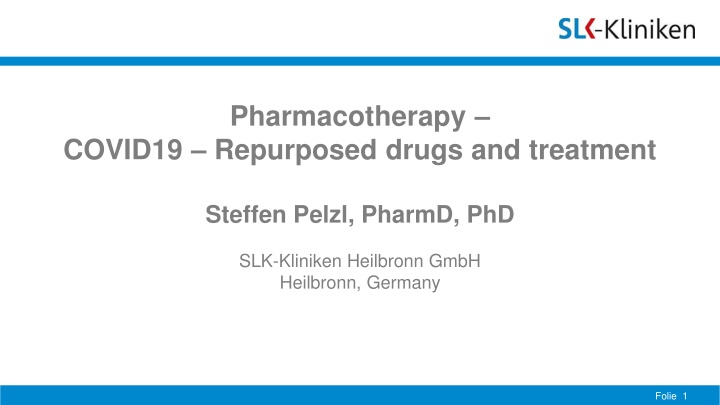
COVID-19 Pharmacotherapy and Treatment Overview
Explore the latest updates on COVID-19 pharmacotherapy, repurposed drugs, and treatment strategies. Topics include evidence on Remdesivir and Dexamethasone, risk of VTE in ICU patients, disease characteristics, and COVID-19-specific therapy options for viral response phase. Stay informed on the classification of COVID-19 disease and more.
Download Presentation

Please find below an Image/Link to download the presentation.
The content on the website is provided AS IS for your information and personal use only. It may not be sold, licensed, or shared on other websites without obtaining consent from the author. If you encounter any issues during the download, it is possible that the publisher has removed the file from their server.
You are allowed to download the files provided on this website for personal or commercial use, subject to the condition that they are used lawfully. All files are the property of their respective owners.
The content on the website is provided AS IS for your information and personal use only. It may not be sold, licensed, or shared on other websites without obtaining consent from the author.
E N D
Presentation Transcript
Pharmacotherapy COVID19 Repurposed drugs and treatment Steffen Pelzl, PharmD, PhD SLK-Kliniken Heilbronn GmbH Heilbronn, Germany Folie 1
Disclosure Conflict of interest: nothing to disclose Folie 2
Self-assessment questions Is there evidence for a significant mortality benefit in Remdesivir treated patients who were on oxygen supplementation but did not require high-flow oxygen or ventilatory support ? Should Dexamethasone be used for either prevention or treatment of mild to moderate COVID-19 (patients not on oxygen)? Do ICU patients show an increased risk for venous thromboembolism (VTE) despite prophylactic- dose anticoagulation? Folie 3
Coronavirus Disease 2019 - Characteristics Clinical Manifestations Severity of Symptomatic Infection Mild disease (no or mild pneumonia) 81% Cough 50% Fever 43% Severe disease (eg, with dyspnea, hypoxia, or >50% lung involvement) 14% Myalgia 36% Critical disease (eg, with respiratory failure, shock, or multiorgan dysfunction) 5% Headache 34% Dyspnea 29% However Sore throat 20% Among hospitalized patients, the proportion of critical or fatal disease is higher. In a study that included 2741 patients who were hospitalized for COVID-19 in a New York City health care system, 665 patients (24 percent) died or were discharged to hospice. Diarrhea 19% Nausea/vomiting 12% Loss of smell or taste <10% Abdominal pain <10% Wu et al., JAMA, 2020, Apr 7, 323 Stokes et al., MMWR, 2020, June 19, 69 Petrilli et al., BMJ, 2020, May 22, 369 Folie 4
Classification of COVID-19 disease Siddiqi et al., J Heart Lung Transplant., 2020, May 2020, 39 Folie 5
COVID-19-Specific Therapy viral response phase early infection Agents proposed for therapy: Lopinavir-ritonavir Azithromycin Hydroxychloroquine Remdesivir Baricitinib Favipiravir Sofosbuvir plus Daclatsvir Fluvoxamine Famotidine Colchicine Ivermectin Interferons Vitamin D Vitamin C Zinc Convalescent plasma WHO Solidarity Trial Consortium. N Engl J Med., 2020, Dec 2, epub Folie 6
COVID-19-Specific Therapy viral response phase early infection Positive SARS-CoV-2 PCR during last 48h Ct value <30 Age >12 Symptoms duration <7 days SARS-CoV-2 pneumonia Oxygen saturation < 94% under room conditions and need for oxygen supplementation Normal kidney and liver function ACTT-1 - multinational, randomized, placebo-controlled trial 1062 patients with confirmed COVID-19 and evidence of lung involvement 85% had severe disease and 27% were receiving invasive mechanical ventilation or ECMO at baseline Remdesivir resulted in faster time to recovery (median 10 vs. 15 days) The reduced time to recovery was only statistically significant among patients who were on low-flow oxygen at baseline Among the subset of patients on mechanical ventilation or ECMO at baseline, the time to recovery was similar with remdesivir and placebo Overall, there was a trend towards lower 29-day mortality that was not statistically significant (11.4% vs. 15.2% with placebo) Among the subset of patients who were on oxygen supplementation but did not require high-flow oxygen or ventilatory support, there was a statistically significant mortality benefit (4.0% vs. 12.7%, HR 0.30, 95% CI 0.14-0.64). Beigel et al., N Engl J Med., 2020, Nov 5, 383 www.rki.de/covid-19-therapie-stakob - accessed on 21 January 2021 Folie 7
COVID-19-Specific Therapy host inflammatory response pulmonary phase Patients with confirmed or suspected COVID-19 2104 and 4321 patients randomly assigned to receive dexamethasone or usual care Baseline comorbidities and need for oxygen or ventilatory support were comparable Reduction in 28-day mortality: Overall 17% relative reduction (22.9 vs. 25.7%) Patients on IMV or ECMO at baseline 36 % relative reduction (29.3 vs. 41.4%) Age-adjusted analysis - 12.3% absolute reduction Patients on noninvasive oxygen therapy at baseline 18% relative reduction (23.3 versus 26.2%) Age-adjusted analysis - 4.1% absolute reduction No benefit among patients who did not require either oxygen or ventilatory support - nonstatistically significant trend towards higher mortality (17.8 vs. 14%) The RECOVERY Collaborative Group, N Engl J Med., 2020, Jul 17, epub Folie 8
COVID-19-Specific Therapy host inflammatory response pulmonary phase Data from randomized trials overall support the role of glucocorticoids for severe COVID-19 Recovery Collabvorative Group - reduced mortality (RR 0.83, 95% CI 0.75-0.93) randomized trial Sterne et al. reduced mortality (OR 0.66, 95% CI 0.53-0.82) meta-analysis Siemieniuk et al. reduced mortality (OR 0.87, 95% CI 0.77-0.98) meta-analysis Dexamethasone for severely ill patients with COVID-19 who are on supplemental oxygen or ventilatory support. at a dose of 6 mg daily for 10 days or until discharge, whichever is shorter. not be used for either prevention or treatment of mild to moderate COVID-19 (patients not on oxygen). monitor for adverse effects including hyperglycemia and infections. The RECOVERY Collaborative Group, N Engl J Med., 2020, Jul 17, epub Sterne et al., JAMA, 2020, Oct 6, 324 Siemienik et al., BMJ, 2020, Jul 30, 370 Folie 9
COVID-19-Specific Therapy host inflammatory response hyperinflammation phase Background Critical COVID-19 - elevated inflammatory markers (D-dimer, ferritin) and elevated pro-inflammatory cytokines (IL-6) Blocking inflammatory pathway may prevent disease progression Several agents that target IL-6 pathway have been evaluated in randomized trials for treatment of COVID-19 Clinical trials Results from randomized trials, have been mixed, and several trials do not indicate a mortality benefit or other clear clinical benefit Mehta et al., Lancet, 2020, Mar 28, 395 Stone et al., N Engl J Med., 2020, Oct 21, 383 Hermine et al., JAMA Intern Med., 2021, Jan 1, 181 Salvarani et al., JAMA Intern Med., 2021, Jan 1, 181 Salama et al., N Engl J Med. 2021, Jan 7, 384 Gordon et al., https://www.medrxiv.org/content/10.1101/2021.01.07.21249390v2.full.pdf (Accessed on January 19, 2021) Folie 10
COVID-19-Specific Therapy host inflammatory response hyperinflammation phase open-label international randomized trial of 803 patients with severe COVID-19 who were admitted to the intensive care unit and required either respiratory or cardiovascular support Tocilizumab (n = 353) and sarilumab (n = 48) each reduced in-hospital mortality compared with standard of care (28 and 22 versus 36 percent; odds ratio for hospital survival 1.64, 95% CrI 1.14-2.35 for tocilizumab and 2.01, 95% CrI 1.18-4.1 for sarilumab). All patients were enrolled within 24 hours of admission to the intensive care unit, >80 percent received concomitant glucocorticoids, and 33 percent received remdesivir. Gordon et al., https://www.medrxiv.org/content/10.1101/2021.01.07.21249390v2.full.pdf (Accessed on January 19, 2021) Folie 11
COVID-19-Specific Therapy host inflammatory response hyperinflammation phase Evaluation of trial results Overall mortality rates in other trials were lower, suggesting a more severely ill population in this trial. IL-6 inhibitors can benefit a selected group of critically ill patients who are treated early (eg, within 24 hours) in the course of critical illness. Potential role for extracorporeal technologies to absorb cytokines Coupled-Plasma Filtration Adsorption (CPFA) + Continuous Veno-Venous Hemofiltration (CVVH) Shareef et al., Blood Purif., 2020, May, 28 Chen et al., Ren Fail., 2020, Nov, 42 Folie 12
COVID-19-Specific Therapy host inflammatory response phase coagulation abnormalities COVID-19 associated with hypercoagulable state associated with acute inflammatory changes Fibrinogen and D-dimer increased - modest prolongation of prothrombin time (PT) and activated partial thromboplastin time (aPTT) - mild thrombocytosis or thrombocytopenia Risk for venous thromboembolism (VTE) increased - prevalences of 25 to 43 percent in ICU patients - despite prophylactic-dose anticoagulation Pulmonary microvascular thrombosis increased - risk for arterial thrombotic events such as stroke and myocardial infarction increased Libby P, L scher T, Eur Heart J., 2020, Sep 1, 41 Connors et al., J Thromb Haemost., 2020, Jul, 18 Allegra et al., Ann Hematol., 2020, Sep, 99 Folie 13
COVID-19-Specific Therapy host inflammatory response phase coagulation abnormalities J Thromb Thrombolysis., 2020, Aug, 24 Accessed on 21 January 2021 Folie 14
COVID-19-Specific Therapy Vaccinations mRNA BNT162b1 Prophylactic SARS-CoV-2 mRNA enclosed into lipid nanoparticle NCT04368728 mRNA 1273 Novel lipid nanoparticle (LNP)-encapsulated mRNA-based vaccine that encodes for a full-length spike (S) protein of SARS-CoV-2 NCT04470427 Viral vector ChAdOx1-S nCoV-19 vaccine Adenovirus Type 5 vector that expresses S protein NCT04516746 ISRCTN89951424 NCT04540393 CTRI/2020/08/027170 Viral vector Ad26.COV2.S Adenovirus vectored vaccine NCT04505722 Rawat et al., Eur J Pharmacol., 2021, Feb 5, 892 Folie 15
Take home messages The optimal approach for treatment of COVID-19 is still uncertain. Trial data suggest a mortality benefit with dexamethasone and a possible clinical benefit with remdesivir. Based on the pathogenesis of COVID-19, approaches that target the virus itself are more likely to work early in the course of infection, whereas approaches that modulate the immune response may have more impact later in the disease course. Folie 16
Thank you for your attention Folie 17



